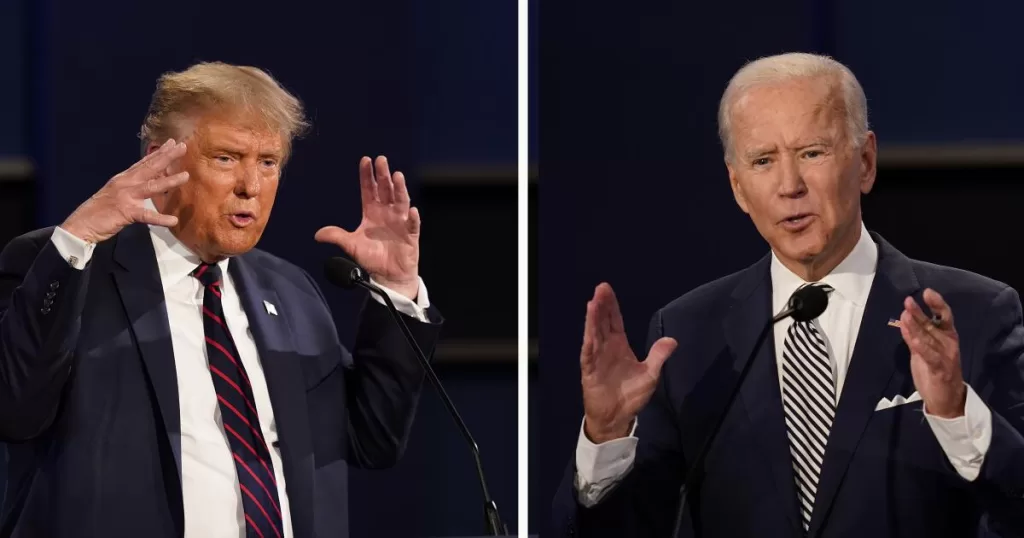Goody! Looks like we’ll have two Biden-Trump debates to tide us over this summer.
It seems that way. But who knows.
Wait. I shouldn’t cancel my dream vacation just yet?
I wouldn’t.
I mean, I don’t want to pop your party balloon. If a political debate is your idea of a good time — rather than, say, sitting on the sugary sands of some beach watching a dappled sunset play on the water, more power to you!
But we’re still a long way from the moment President Biden and former President Trump share a debate stage.
I thought it was all settled.
The prospective debates did come together rather quickly after Biden issued a taunting challenge and Trump immediately agreed to two face-to-face meetings.
The first is scheduled for June 27 on CNN. The second is set for Sept. 10 on ABC.
However, there are still a lot of details to be worked out, and plenty of opportunity for one party or the other to walk away.
Remember, in 2020 Trump bailed on a debate with Biden because the terms — a remote set-up, taken as a precaution during the COVID-19 pandemic — weren’t to his liking.
I thought all the details were ironed out by an independent debate commission.
That’s how it used to work.
Starting in 1987, the Commission on Presidential Debates — a nonprofit entity with a bipartisan board of directors — worked with the television networks to set up three presidential and one vice presidential debate each election cycle.
Matters such as the format, the choice of moderators and the seating (or standing) arrangements were settled ahead of time.
All the candidates had to do, apart from cramming for the 90-minute sessions, was show up.
So what happened?
The commission laid out its plans for four debates this fall, starting on Sept. 16 and ending on Oct. 9. But Biden and Trump chose to disregard the commission and ignore its proposed schedule.
They can do that?
Yes, indeed. There’s absolutely no requirement the candidates abide by the commission’s recommendations, or debate at all.
Jeepers.
Actually, the move wasn’t all that startling.
Trump was unhappy with the commission for several reasons. He complained about the moderators chosen in 2016 and again in 2020. He also didn’t like a decision to mute candidates’ microphones during parts of the second 2020 debate after he persistently talked over Biden in their first meeting.
Two years ago, at Trump’s behest, the Republican National Committee officially withdrew from the debate commission.
So Trump blew it up.
No. Biden had issues with the commission as well.
Two of his top political advisors, Anita Dunn and Ron Klain, were part of a bipartisan panel that issued a 2015 report calling for an overhaul of the presidential debate process by, among other things, expanding the pool of potential moderators and eliminating on-site audiences.
The bottom line is both campaigns thought it better suited their interests to bail on the commission and work out a debate schedule by themselves.
So it’s a win-win for Biden and Trump?
You could look at it that way.
Biden doubtless would have preferred to come nowhere near Trump. If he was running away with the contest, the president might have gotten his wish.
But debates have come to be expected of the two major party candidates, and if Biden refused it would have invited further unwanted questions about his health and stamina.
By agreeing to two debates, and no more, Biden limits the risks of a campaign-jeopardizing stumble. Also, by holding the debates earlier than usual — the last takes place nearly two months before election day — it allows the president plenty of time to recover politically if he turns in a less than stellar performance.
That said, Biden could be boffo — or at least perform decently enough. He’s shown a penchant for rising to important occasions, such as his well-received State of the Union speech in March.
What’s in it for Trump?
He’s been salivating to get onstage with Biden, repeatedly saying he’d debate the president anytime, anywhere. So Trump couldn’t very well refuse when Biden replied, OK, let’s do it.
More than that, Trump and his strategists are thoroughly convinced that Biden is a walking, or rather, doddering disaster. In fact, while it’s typical for a candidate to downplay expectations — the better to crow about their performance once the debate is over — Trump has done the opposite.
He’s described Biden as “the WORST debater I have ever faced” and a man who can’t “put two sentences together.”
So if he puts two sentences together, Biden wins?
I wouldn’t say so.
It doesn’t matter how high, or low, Biden or Trump set expectations. Voters can watch and judge their performances independent of any pre-debate spin. That’s why tens of millions of people tune in. The debates offer one of the few occasions during a campaign where the candidates can be seen unscripted and thinking and acting on their feet.
What about other candidates?
Trump and Biden would both be happy to exclude Robert F. Kennedy Jr., the leading independent candidate, since neither side is certain whom he helps or hurts more.
Regardless of how Kennedy performed, standing on the same stage as Biden and Trump would automatically elevate his candidacy.
That’s another reason the two major party candidates agreed to their own arrangements — though Kennedy could still qualify under the criteria put forth by CNN and ABC. His participation is among the open questions surrounding the debates and something that could end up nixing one or both.
So should I stick with or cancel my summer plans?
Go ahead. Get out there and see the world. It’s summertime!
If you’re that concerned about missing the political action, just make sure your cabana or mountain aerie has reliable Wi-Fi.
